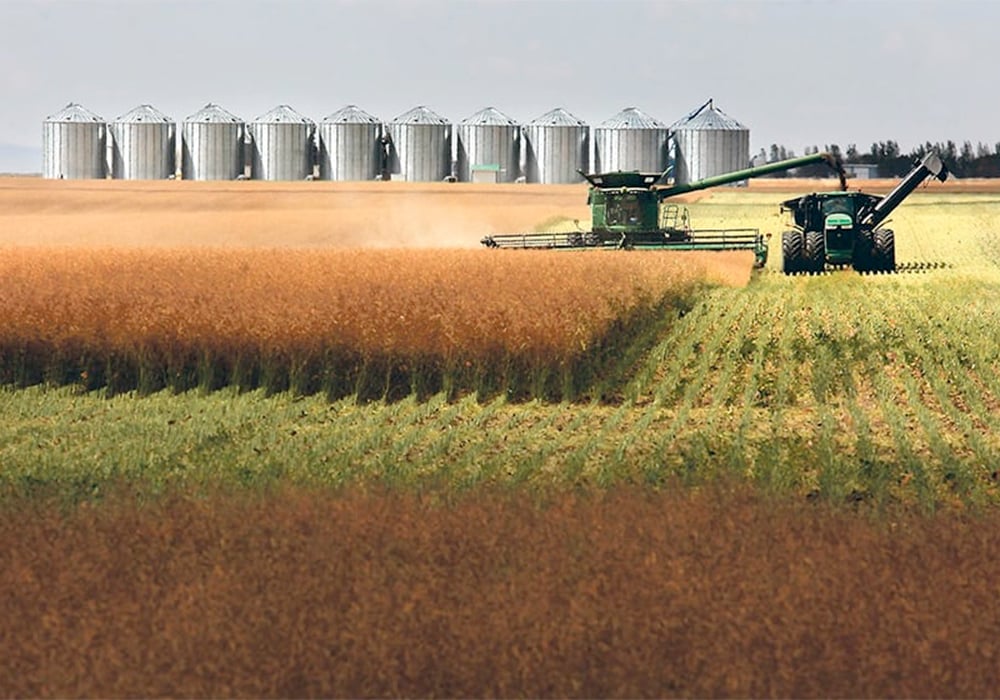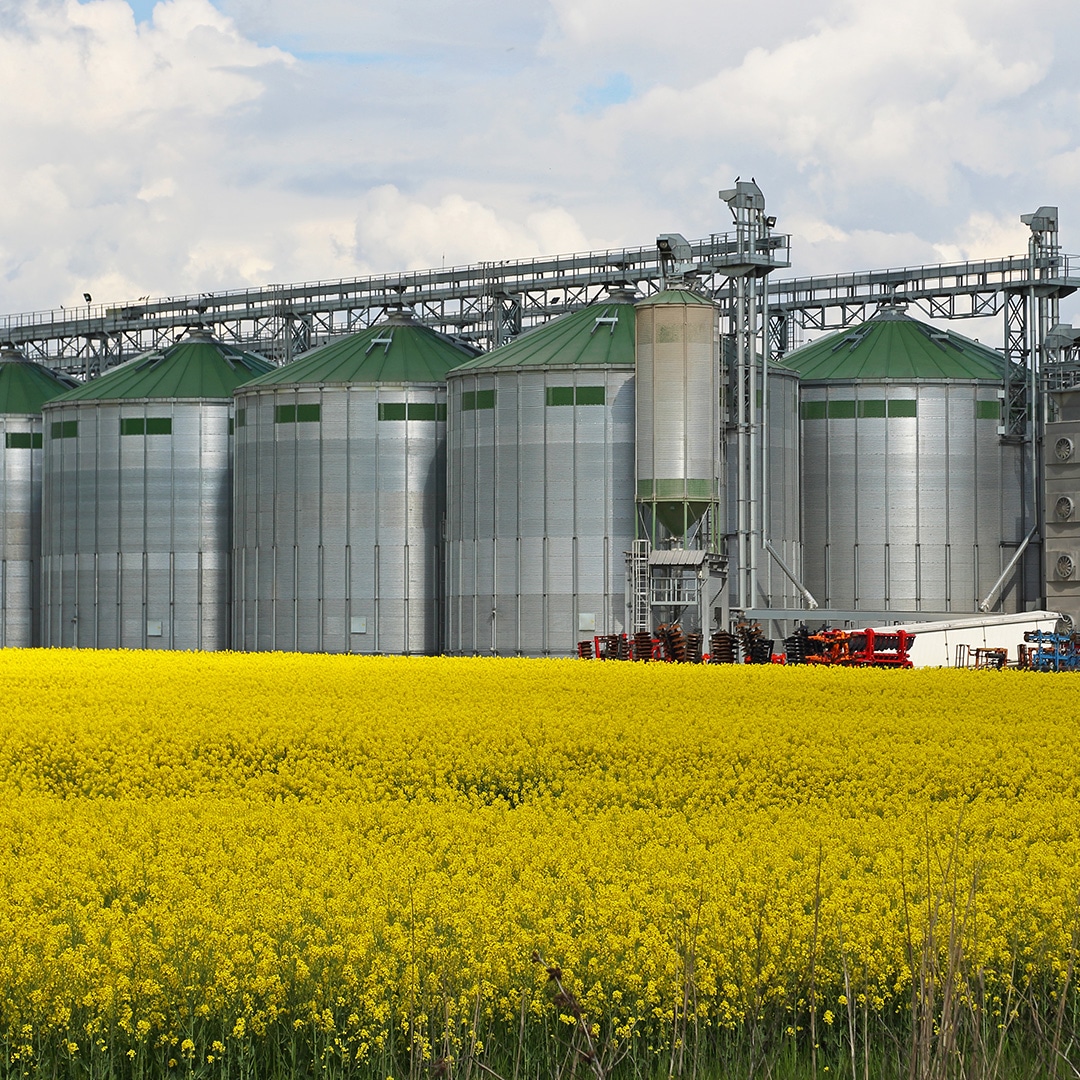Canola Quick Bytes
A supplement to U.S. Canola Digest
Capitol Hill

Despite the U.S. Environmental Protection Agency’s (EPA’s) Dec. 1 approval of canola oil-based renewable diesel, sustainable aviation fuel, naphtha, heating oil and propane as advanced biofuels under its Renewable Fuel Standard (RFS) program, its proposed RFS volumes for 2023, 2024 and 2025 underestimate canola’s potential contribution to U.S. biofuel production. J. Alan Weber, partner at M4 Consulting and U.S. Canola Association (USCA) liaison to Clean Fuels Alliance America (CFAA), explains this new challenge in the USCA Blog.
In December, the EPA issued a proposed rule to set the RFS Required Volume Obligations (RVOs) for 2023-2025. The lackluster volumes for the biomass-based diesel (BBD) category calls for only 2.82 billion gallons in 2023, 2.89 in 2024 and 2.95 in 2025 – growth of less than 200 million gallons over the three-year period. The USCA, CFAA and industry stakeholders will push for revisions to the proposed rule to reflect existing production levels and enable greater growth in future years. The public comment period is open until Feb. 10. The USCA will submit comments and provide guidance to regional canola associations and individuals who also wish to contribute. Stakeholders can go to the CFAA Action Center to submit comments. Some of the key messages to the EPA are:
- The proposed BBD volumes are below existing production levels and will undercut industry plans for new capacity expansions.
- The EPA’s data shows that the U.S. BBD market reached 3.1 billion gallons in 2021 and exceeded that level in 2022. These past production levels are higher than the EPA’s proposed volumes over the next three years.
- The amount the EPA used for renewable diesel capacity (one part of the overall BBD) is outdated. It cited 1.5 billion gallons even though capacity is now over 2 billion gallons per year, according to the U.S. Energy Information Administration.
- The biodiesel and renewable diesel industries support more than 75,000 jobs and $23 billion in economic activity across the country.
Agronomy
 The U.S. Department of Agriculture (USDA) issued its final crop report for the 2022 growing season on Jan 12, noting that total U.S. canola production was a record high 3.82 billion pounds from a record acreage of 2.2 million acres. Average canola yields in North Dakota were 1,820 pounds per acre, which is down from its October estimate of 1,920. This is the first time in many years that the USDA has reduced yields from prior estimates. Total production in North Dakota is still expected to be a record 3.25 billion pounds. The USDA revised the average yields for Minnesota quite significantly from its October estimates as well, now indicating canola yields were 2,410 pounds per acre, a new record. The U.S. Department of Agriculture (USDA) issued its final crop report for the 2022 growing season on Jan 12, noting that total U.S. canola production was a record high 3.82 billion pounds from a record acreage of 2.2 million acres. Average canola yields in North Dakota were 1,820 pounds per acre, which is down from its October estimate of 1,920. This is the first time in many years that the USDA has reduced yields from prior estimates. Total production in North Dakota is still expected to be a record 3.25 billion pounds. The USDA revised the average yields for Minnesota quite significantly from its October estimates as well, now indicating canola yields were 2,410 pounds per acre, a new record.
 Verticillium stripe was on the rise in Manitoba in 2023, with 40 percent of the disease found in canola crops. Justine Cornelsen, agronomic and regulatory services manager at BrettYoung Seeds, believes that straight-cutting is partially to blame, reports The Western Producer. She says when you cut through micro-sclerotia, they go “everywhere,” falling into soil and remaining in plant stubble after canola is harvested. Verticillium stripe was on the rise in Manitoba in 2023, with 40 percent of the disease found in canola crops. Justine Cornelsen, agronomic and regulatory services manager at BrettYoung Seeds, believes that straight-cutting is partially to blame, reports The Western Producer. She says when you cut through micro-sclerotia, they go “everywhere,” falling into soil and remaining in plant stubble after canola is harvested.
In her AgDaily column, the ”Farm Babe” demystifies pesticides by likening farmers to those who get rid of pests in our homes. “Farmers kill bugs just like exterminators do,” she writes. “We don’t want them in our homes, we don’t want them in our food. Farmers solve problems in the food supply so we don’t have to … Remember that not all heroes wear capes — some of them drive tractors.”
Nutrition
 The World Health Organization (WHO) announced it plans to eliminate industrially-produced trans fat from the global food supply in 2023 via its REPLACE action program. This initiative began in 2018 and to date, 60 countries, accounting for nearly 3.4 billion people, have limited the use of trans fat. A REPLACE event on Jan. 23 highlighted progress in the past four years and called upon more countries to take action this year. The World Health Organization (WHO) announced it plans to eliminate industrially-produced trans fat from the global food supply in 2023 via its REPLACE action program. This initiative began in 2018 and to date, 60 countries, accounting for nearly 3.4 billion people, have limited the use of trans fat. A REPLACE event on Jan. 23 highlighted progress in the past four years and called upon more countries to take action this year.
Lead Stories debunked unfounded claims on Instagram that canola oil contains harmful levels of erucic acid and causes “heart lesions.” On the contrary, canola oil has very little erucic acid and may benefit the heart, according to the U.S. Food and Drug Administration and Dr, Alice Lichtenstein, director and senior scientist of the Cardiovascular Nutrition Laboratory at Tufts University’s Friedman School of Nutrition Science and Policy.
 On Jan. 19, the Departments of Health and Human Services (HHS) and Agriculture (USDA) announced 20 nationally recognized scientific experts will serve on the 2025 Dietary Guidelines Advisory Committee, which will review the scientific evidence on nutrition and public health across all life stages. A public comment period opened the same day, which will remain open throughout the committee’s work. The USCA will submit comments about the nutritional benefits of canola oil and supporting research. The committee’s work will culminate in a scientific report for the HHS and USDA to consider, along with public and agency comments, as they develop the Dietary Guidelines for Americans 2025-30. On Jan. 19, the Departments of Health and Human Services (HHS) and Agriculture (USDA) announced 20 nationally recognized scientific experts will serve on the 2025 Dietary Guidelines Advisory Committee, which will review the scientific evidence on nutrition and public health across all life stages. A public comment period opened the same day, which will remain open throughout the committee’s work. The USCA will submit comments about the nutritional benefits of canola oil and supporting research. The committee’s work will culminate in a scientific report for the HHS and USDA to consider, along with public and agency comments, as they develop the Dietary Guidelines for Americans 2025-30.
Other Country News
 After years of inactivity on international biotech crop approvals, China finally approved the importation of eight genetically modified crops, including Corteva’s glyphosate-resistant canola. Alexis Taylor of the U.S. Department of Agriculture says that “access to biotechnology is especially important because of heightened concerns about global food security and high commodity prices.” After years of inactivity on international biotech crop approvals, China finally approved the importation of eight genetically modified crops, including Corteva’s glyphosate-resistant canola. Alexis Taylor of the U.S. Department of Agriculture says that “access to biotechnology is especially important because of heightened concerns about global food security and high commodity prices.”
Merit Functional Foods Corporation was notified by Health Canada that its canola protein isolate and cruciferin-rich version are approved for human consumption. The government agency determined the products meet its safety guidelines and pose no concerns.
The Canola Council of Canada and Canada Grains Council will host the 2023 Canadian Crops Convention March 7-9 in Ottawa, Ontario. The deadline to register is Thursday, Feb. 23. Check out the speaker line up, agenda and evening events. Reserve a room under the convention block at the Westin Ottawa until Monday, Feb. 6.
Latest Industry News
 A biodiesel plant is on the horizon for Pullman, Wash., which would use locally grown canola as feedstock, according to Big Country News. The Port of Whitman County is teaming up with a local start-up called AgTech OS to produce 10.8 million gallons of biodiesel every year. About 100,000 tons of canola will be needed annually from local farmers, amounting to about 70,000 acres, according to Karen Sowers of the Pacific Northwest Canola Association. The port will contribute $1.25 million to the purchase of 100 acres of land for the proposed facility in conjunction with a $5 million loan from the Washington State Department of Commerce. The plant itself will cost about $111 million, which AgTech OS plans to pay for with private and public funds. A biodiesel plant is on the horizon for Pullman, Wash., which would use locally grown canola as feedstock, according to Big Country News. The Port of Whitman County is teaming up with a local start-up called AgTech OS to produce 10.8 million gallons of biodiesel every year. About 100,000 tons of canola will be needed annually from local farmers, amounting to about 70,000 acres, according to Karen Sowers of the Pacific Northwest Canola Association. The port will contribute $1.25 million to the purchase of 100 acres of land for the proposed facility in conjunction with a $5 million loan from the Washington State Department of Commerce. The plant itself will cost about $111 million, which AgTech OS plans to pay for with private and public funds.
In December, the Minnesota Canola Council (MCC) held a symposium with industry experts who discussed current and future research and new industry innovations. The MCC is seeking canola farmers interested in running for At Large and District 3 (Beltrami, Koochiching, or Lake of the Woods Counties) director seats, which are up for election this year. Those interested should contact Executive Director Beth Nelson. The MCC also reminds Minnesota farmers that the final date to apply for crop insurance for spring crops is March 15. Finally, the MCC’s annual report and Canola Production Centre report are now available.
 Canola prices started strong this year due to Argentina experiencing its driest year on record in 30 years, reports Farm & Ranch Guide. Demand is also .Market analysts predict that with current usage rates of canola in North America, supplies could run out before the end of the year. Canola prices started strong this year due to Argentina experiencing its driest year on record in 30 years, reports Farm & Ranch Guide. Demand is also .Market analysts predict that with current usage rates of canola in North America, supplies could run out before the end of the year.
Red River Farm Network spoke with Northern Canola Growers Association (NCGA) Executive Director Barry Coleman about the future of canola in 2023. He predicts that due to record numbers in 2022, North Dakota will “be in that 1.8-2-million-acre range in 2023.”
The NCGA and North Dakota State University will host a “Getting it Right in Canola Production” virtual meeting on March 9. This annual crop production conference features the latest research-based production information presented by NDSU specialists. Canola growers can go to northerncanola.com.
About the USCA
The USCA’s annual membership meeting will be in Washington, D.C., March 14-16 at the Phoenix Park Hotel on Capitol Hill. The group block for rooms ($269/night) closes on Tuesday, Feb. 14.
Get social with us on Instagram, LinkedIn, Facebook, Twitter and YouTube.
Want to promote your products or services to canola producers and industry members? Visit our advertising pages to find specs, deadlines and rates to advertise in this monthly e-newsletter or on UScanola.com.
|


 The U.S. Department of Agriculture (USDA) issued its final crop report for the 2022 growing season on Jan 12, noting that total U.S. canola production was a record high 3.82 billion pounds from a record acreage of 2.2 million acres. Average canola yields in North Dakota were 1,820 pounds per acre, which is down from its October estimate of 1,920. This is the first time in many years that the USDA has reduced yields from prior estimates. Total production in North Dakota is still expected to be a record 3.25 billion pounds. The USDA revised the average yields for Minnesota quite significantly from its October estimates as well, now indicating canola yields were 2,410 pounds per acre, a new record.
The U.S. Department of Agriculture (USDA) issued its final crop report for the 2022 growing season on Jan 12, noting that total U.S. canola production was a record high 3.82 billion pounds from a record acreage of 2.2 million acres. Average canola yields in North Dakota were 1,820 pounds per acre, which is down from its October estimate of 1,920. This is the first time in many years that the USDA has reduced yields from prior estimates. Total production in North Dakota is still expected to be a record 3.25 billion pounds. The USDA revised the average yields for Minnesota quite significantly from its October estimates as well, now indicating canola yields were 2,410 pounds per acre, a new record. Verticillium stripe was on the rise in Manitoba in 2023, with 40 percent of the disease found in canola crops. Justine Cornelsen, agronomic and regulatory services manager at BrettYoung Seeds
Verticillium stripe was on the rise in Manitoba in 2023, with 40 percent of the disease found in canola crops. Justine Cornelsen, agronomic and regulatory services manager at BrettYoung Seeds The
The 
 After years of inactivity on international biotech crop approvals,
After years of inactivity on international biotech crop approvals,  A biodiesel plant is on the horizon for Pullman, Wash., which would use locally grown canola as feedstock, according to
A biodiesel plant is on the horizon for Pullman, Wash., which would use locally grown canola as feedstock, according to  Canola prices started strong this year due to
Canola prices started strong this year due to